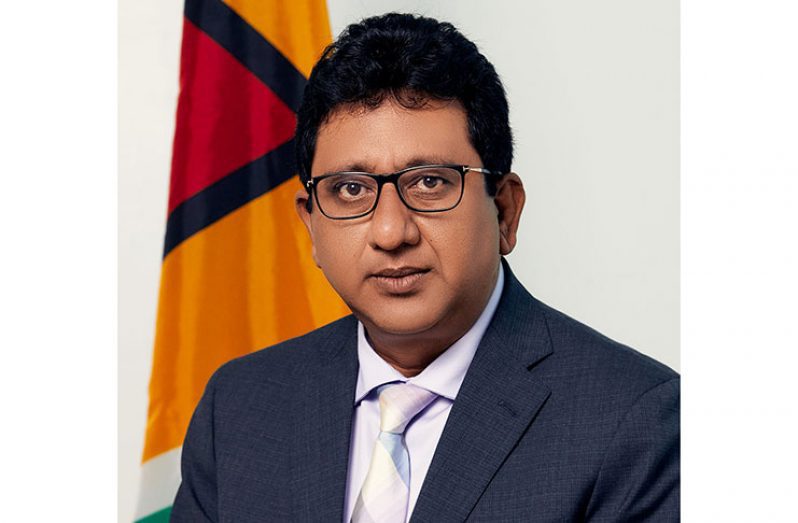— Attorney-General
THE ruling delivered by Chief Justice (ag), Roxane George, S.C., on Thursday, in the matter seeking the disclosure of certified copies of the Statements of Poll (SoPs) and Statements of Recount (SoRs) has been hailed by Attorney-General and Minister of Legal Affairs, Anil Nandlall, S.C., as being “in consonance with all the general and acceptable established principles of law”.
The matter was filed by the Commissioner of Police (ag), Nigel Hoppie, and Director of Public Prosecutions (DPP) Shalimar Ali-Hack, S.C. for Orders to obtain certified copies of the SoPs and SoRs from the March 2, 2020 General and Regional Elections that are currently lodged with the Registrar of the High Court, Sueanna Lovell.
With several employees of the Guyana Elections Commission (GECOM) being prosecuted with regard to their conduct during the March 2, 2020 polls, the DPP had advised and instructed the Guyana Police Force (GPF) to obtain certified copies of the SoPs and SoRs as part of their investigations and gathering of evidence for presentation to the Court.
The employees at reference are Mr. Clairmont Mingo, GECOM’s District Four Returning Officer, who was charged with four counts of Misconduct in Public Office; GECOM’s Chief Elections Officer (CEO), Mr. Keith Lowenfield, who was charged with three counts of Misconduct in Public Office, and three counts of Forgery; and Ms. Roxanne Myers, Deputy CEO, who was charged with two counts of Misconduct in Public Office.
Attorney-at-law Nigel Hughes, on behalf of his client, Lowenfield, had made an application before the Chief Justice seeking to be listed as intended respondent in the case. Hughes argued that Lowenfield, the custodian of the documents, is only authorised to make the documents available in an elections petition.
In an interview with the media after the ruling on Thursday, Nandlall listed a plethora of legal arguments and precedents to buttress his praise for the Chief Justice’s ruling.
Nandlall noted that it is elementary knowledge that the statements of polls are available in the public domain, subsequent to being posted to the wall of each polling place, after the count of ballots at that polling place would have concluded on Elections night.
WRONG FROM THE INCEPTION
“The refusal by GECOM, and, in particular, the CEO to disclose those documents to the media, to the political parties, to the stakeholders and to the public was a decision that was perverted and wrong, in principle, from the inception,” he said.
The Attorney-General explained that legally, by virtue of a search warrant, the police possess the authority to enter any premises and seize property of an evidential nature to assist with investigations. However, the police instead had written to obtain the certified copies, but were denied same, without a court order.
He explained that while Mr Lowenfield is the legal custodian of the documents, he is not the exclusive keeper as it is obvious that in the appropriate cases, the CEO would have a duty to deliver those documents if the law requires the use of them at another forum.
“The law will never create offences in relation to an election on one hand and then on the other hand prevent relevant evidence from being adduced to prove those offences, because the law would obviously be on a collision course with itself,” he explained.
He further explained that evidence that is available, relevant and probative, is always admissible in a court of law, and a person who is in charge of prosecuting an offence, before a court of law is entitled to possession of, or use of, that evidence wherever it is located in order to establish that offence.
UNTENABLE
“All those principles concatenate to justify or to render the Chief Justice’s ruling very sound in law so I am not surprised that the ruling is in the manner in which it came down, that was always the legal position. It was untenable for Mr. Lowenfield to even think that he has exclusive control of, and possession of, these documents to the exclusion of the world,” Nandlall said.
“He has, as a statutory officer, the power to keep the documents, the originals, because of the office he holds for the purpose of future use but that can’t be to the exclusion of the use for other purposes that the law designate these documents to be used for,” he added.
The Attorney-General explained that Lowenfield was not listed as a party when the matter was filed; however, the rules and procedures of an appeal may allow him to mount an appeal against the Chief Justice’s decision to be listed as a party to the litigation.
“He was never joined, the Chief Justice went straight to the merits, why are you going to be joined? You want to join in order to block these documents from being disclosed? Why join you and tell you your application is going to fail? Why not deal with it one time? So, the Chief Justice invited submissions and the matter was dealt with on its merit, so he was never made a party,” Nandlall explained.
However, Nandlall noted that if the Appellate Jurisdiction does find it reasonable for Mr Lowenfield to join the parties, by that time the process of delivering the certified copies of the SoPs and SoRs to the DPP and CoP would have already concluded.
“I suspect that the DPP is moving swiftly to secure the Statements of Poll because they are needed, according to the application before the court, to be presented as evidence in the criminal charges which are already before the magistrates’ court,” the Attorney-General said.



.jpg)











